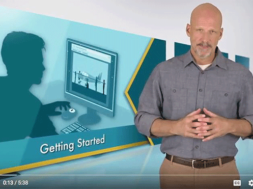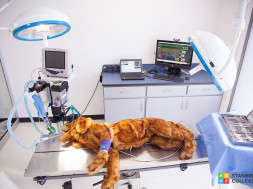
Apply Effective Learning Techniques; Ed-Tech that Really Works
By Eric Evans, President and CEO, Bryan University
One evening a few years back, I was sitting in my home office enjoying my favorite pastime – catching up on various state, accreditation and federal compliance updates – when my son walked into the room carrying four notebooks with an anxious look on his face. I thought to myself, finally an opportunity to successfully fulfill my role as a father and share all the wisdom and knowledge I’ve accumulated over the years. He looked at me and said, “Dad, I have my final AP test in biology in two days, what am I supposed to study from all of these notebooks?” My feelings quickly changed from all-knowing father to feelings of, he’s in trouble if he doesn’t know what he needs to review and there is no way he is going to review all the material in time for his exam. As I looked back at him, I could tell that he could tell, that my feeling of “you can succeed” and his feeling of “I can succeed” was quickly diminishing.
I share this initial experience wondering how many of our students have these same thoughts and feelings as they attend our lectures, read their books, or try to master the art of procrastination in preparation for an exam or hands-on application experience.
On a deeper level, I wonder how many of our students also experience that feeling of “I can’t succeed,” which unfortunately all too many times surfaces as a drop.
In efforts to avoid this situation from happening and thereby improve graduation rates while also making the education experience more equitable, Bryan University gathered all its instructional designers, learning scientists and various faculty and set out to find a research-backed solution with supporting technology to advance our learning technique to solve this very real forgetting curve.
During this process, we spent a lot of time reviewing Hermann Ebbinghaus’s research around the forgetting curve along with his hypothesis supporting spaced repetition and its positive effect on memory retention. In brief, Ebbinghaus hypothesized that humans start losing memory of learned knowledge over time, in a matter of days or weeks, unless the learned knowledge is consciously reviewed time and again. Ebbinghaus conducted a series of tests on himself with different meaningless three-letter words to determine how long he could remember the words after different time periods. He plotted all his results and created a graph, now referred to as the forgetting curve (Praveen Shrestha, Ebbinghaus Forgetting Curve, in Psychestudy, November 17, 2017, https://www.psychestudy.com/cognitive/memory/ebbinghaus-forgetting-curve).
We contemplated how many of our students really knew how to use spaced repetition (which simply put is using learning strategies such as flashcards, or re-reviewing key terms periodically throughout the week rather than just reading it once) to ensure memory retention so that they would have a strong sense of “I can succeed.” We started researching different educational technology solutions in attempts to find one that really would result in better memory retention at scale, but more importantly, would adapt the experience based on student knowledge to ensure high levels of student satisfaction and self-efficacy. After multiple failed attempts with various software companies and publishers, we stumbled across a new startup at the time called Cerego. Cerego is an educational technology solution that combines artificial intelligence, cognitive science, and proprietary technology to help people get smarter and retain better. At first glance, Cerego appeared to address the underlying science and not only had a well-designed student interface but also enabled us to build our own content while adapting real-time to the base knowledge of each learner.
We decided to pilot this new ed-tech in two of our programs (around 200 students), we still issued books, but we replaced 50% of the lecture with exercises built into Cerego to see what would happen.
Specifically, we took the most important concepts that we knew our students needed to recall either for industry exams, internal exams or projects, and we called them “Learn Its.” We then populated these Learn Its, which took the form of sentences, words, short videos, etc. into the Cerego platform. Next, we assigned a point value to completing the Learn Its and worked with our technology team to seamlessly integrate the solution into our Learning Management System called Canvas. We then trained admissions and our front line faculty to set proper expectations with the students that although they are getting a book, we’ve identified all the key concepts in this new, innovative tool that will help you remember them and or will skip areas you already know to save you time. We then allowed students to complete their Learn Its via computer or mobile device. When students launched the solution, it starts by introducing material and asking if they think they know the answer and then quizzing them. It tracks what they know and if they don’t know it, it tells them the answer and then servers up that data point in a few days – thus real-time adjusting the experience differently to every learner.
Initially, we experienced a lot of push back from students, as they were unfamiliar with learning through this new tool, but after lots of demonstrations and practice, we noticed something very special. Our pilot group of students started to really engage. In fact, we measured a 267% increase in engagement (time spent on learning activities within the learning management system) while reducing faculty lecture time by 50%. We also noted an increase in post lecture/reading assignment submission of 76% to 87% and average assignment grades moving from 69% to 82%. Bryan University’s courses are eight weeks long and we measured these results over approximately four modules or 32 weeks.
What was happening! Our faculty and designers were amazed at the performance improvement, so they quickly went to survey the students and started receiving comments like this:
“Without the Learn Its (Cerego assignments), there is no way I would make it through this course. I am awful at sciences and these assignments saved me. I am finding myself spewing the information at random so it does make you master it!”
“Personally, I am ecstatic about the way in which it prompts and compels me to learn and study. What I enjoy most is how much information I retain. I find the answer popping into my head in a split second.”
I’m pleased to report that Bryan University has now implemented Cerego across all our academic programs from undergraduate certificates through graduate degrees as well as within employee training and on-boarding.
Now back to my son. Well, I didn’t know what the forgetting curve was, nor did I know that technology existed that would have helped my son never find himself in this situation again. We did, however, decide to take a somewhat similar approach in that we took 5 final AP biology practice exams, determined what he did knew, and focused on those areas he didn’t. He ended up passing the AP exam with a high score and moved on to his next subject.
Whether you offer residential or online learning, we at Bryan University highly suggest that you consider trying innovative educational technology that works in efforts to build self-efficacy in your students, enabling a diverse set of learners the opportunity to graduate, while operating more efficiently.
Bryan University is a leading student experience innovator that delivers strong value with social impact, ensuring an equitable and inclusive experience to all.
ERIC EVANS, being fascinated with impact technology his entire life, started his professional journey with PricewaterhouseCoopers in New York City as a systems and process consultant. Eric had the pleasure of working in various industries from entertainment to oil and gas to education, assisting fortune 500 organizations in using technology to advance their strategic initiatives. Then one evening 15 years ago, Eric received a call from his father, inquiring as to his interest in applying his technology passion to online higher education in efforts to solve existing inequalities in outcomes within a family business setting. Eric jumped on the opportunity, and in a few years found himself leading Bryan University’s vision in growth, social impact and learner outcomes. Of late, Eric co-founded and leads a new startup company DeXL, which delivers a better way to learn engine specific partners in higher ed and corporate learning, expanding his ability to help others solve their inequalities in learning.
Contact Information: Eric Evans // President and CEO // Bryan University/DeXL // Tempe, Arizona // 602-384-2555 // eric.evans@bryanuniversity.edu // www.bryanuniversity.edu // www.DeXL.com










